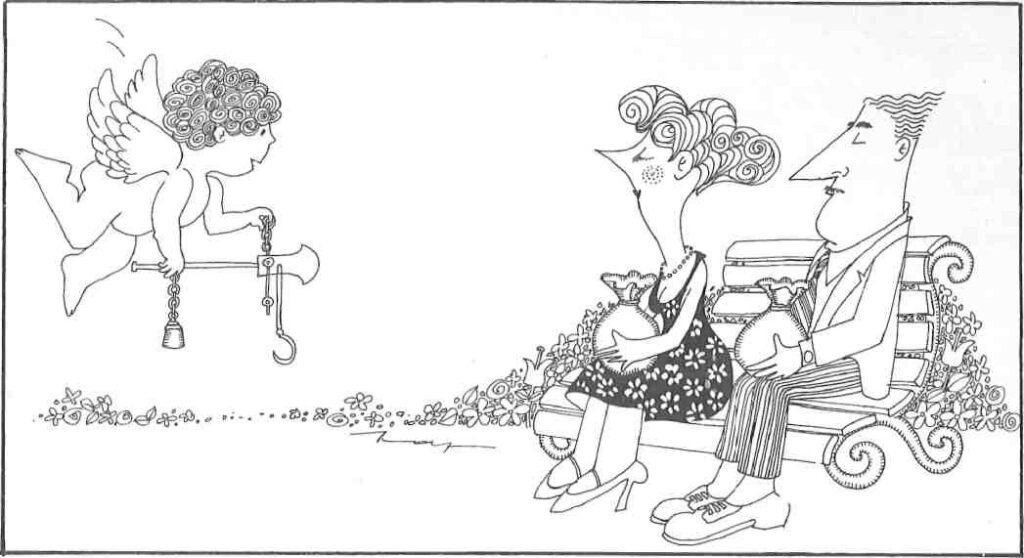
Yet they exist and you can find about a hundred and sixty of them every month in a single-sheet newspaper that costs ten drachmas and hangs prominently outside newspaper kiosks in the Omonia area.
Entitled ‘Efimeris ton Synekesion’ which means ‘The Marriage Contract Newspaper’, it has appeared regularly every month for the past thirty-one years and contains nothing but classified ads placed by men and women of all ages and occupations seeking a life’s companion.

These candidates for the altar waste no time on such frivolities as common interests, hobbies, sports, favourite authors or such-like but come down at once to the nitty gritty with ads like the following:
“YOUNG MAN, aged 28, presentable, 5’8″ tall, high school graduate, employed as technician in civil service with a salary of Drs. 25,000 per month, owning plot of land worth Drs. 1.5 million and car worth Drs. 300,000 seeks miss, aged 18-25, presentable, with moral principles, educated, with furnished house in her own name and with at least three rooms, employed or not.”
Divorced persons tactfully refer to themselves as “having suffered a misfortune in a previous marriage” and this expression is so common it is usually contracted to “suffered misfortune” as in the following specimen:
“YOUNG MAN, aged 35, civil service driver with a salary of Drs. 25,000 per month, suffered misfortune with daughter aged 14 and son aged 7, seeks miss aged 18-35 who has also suffered misfortune, with good character and human sentiments. Acceptable with a child and house.”
This does not mean, of course, that he considers his children to be calamities but that he is divorced and would like his life’s companion to be in the same boat.
Most of the women describe themselves as being “slim, tall, presentable and virtuous” but one of them makes no bones about her avoirdupois and wants another fatty for a husband:
“YOUNG WOMAN, aged 19, portly, pretty, and 5’3″ tall, with high moral principles, suffered misfortune but without child, with a 4-room apartment on the top floor of a 3-story building at Korydallos, working in factory, seeks young man, tall and portly, preferably a technician aged 30-35, honest and with a good character.”
Middle-aged ladies seeking husbands in their sixties cautiously require that they “be healthy” while others who wish to hint at their social status describe themselves as being “the sister-in-law of a brigadier” or “the niece of a senior civil servant”. Other women stipulate that the man they are looking for should be employed by the telephone company (OTE) or the Public Power Corporation or a bank, presumably because the employees of these institutions enjoy privileges that are usually denied to lesser mortals.
One young lady, however, seems to have an inexplicable desire to get hitched to the law:
“MISS aged 23, slim, presentable, graduate in domestic science, virtuous, working, owning 200 olive trees at Rethymnon and enough cash to buy a two-and-a-half room apartment, also owning two plots of land by the sea, seeks young man aged 28-35, preferably a policeman.”
A particularly poignant ad is the following one:
“GENTLEMAN aged 59, never married, average height, presentable, with no obligations, employed by private firm, with house in the provinces, plot of land at Harvati and Drs. 300,000 in cash seeks miss or lady of good, moral and Christian character with the object of creating a family. Acceptable also with small child. Dowry a secondary consideration — whatever she has.”
One emigrant to the States has presumably remained unimpressed by the specimens of American manhood she has come across and has inserted the following ad:
“GREEK-AMERICAN young lady, aged 34, slim, presentable and endowed with Christian principles, of Heptanesian descent, established in California during the past ten years and working as dressmaker, with apartment in Athens, seeks gentleman in Greece, aged 35-45, healthy, presentable, with a good character and permanent, respectable employment.”
Christos Michaelides, who publishes the ‘Marriage Contract Newspaper’, screens applicants who reply to the ads and when he considers them suitable he arranges a meeting between the two parties in his office. He will not say what he charges for the ads or whether he gets an extra fee when advertisers achieve their nuptial ends. He claims his newspaper, which has a press run of two thousand every month, just about breaks even and that he runs it more as a social service than as a profit-making enterprise. A friend of his, however, has remarked that the percentage of his successes ranges between fifty and eighty percent.
Taking into account that the ads usually run consecutively for three months and multiplying the number of ads by 31 years of operation gives us a figure of some 20,000 ads. Sixty-five percent of that is 13,000 marriages that Michaelides is responsible for which should give him the incontestable title of Greece’s top matchmaker. What percentage of these marriages ultimately survives it is impossible to know but Michaelides proudly points to an ad he has accepted for his next issue, placed by the 19-year-old daughter of a client of his who found his bride in the newspaper twenty-two years ago.
Michaelides, who is now in his mid-sixties, explains the philosophy of his life-long mission in an editorial which appears unchanged in every edition of his newspaper.
In it, he claims that love matches cannot possibly form the basis of a sound family structure. He says the thousands of divorces that take place every year are clear proof of the unhappiness caused by such unions. But, he claims, by entering into a marriage contract, a person chooses his life’s companion with his eyes wide open, with no illusions and in all confidence.
He then writes: “Here, in the newspaper’s offices, in the presence of parents and guardians, or only myself, our clients can meet a suitable prospect and have the opportunity to judge him. or her with cold detachment and assess each other’s material and spiritual assets and then decide whether they wish to enter into a marriage contract or not.”
It seems rather sad that romance has been so harshly banned from Michaelides’ prolific matchmaking but the choice is clear: true love or a two-and-a-half room apartment and 200 olive trees.







